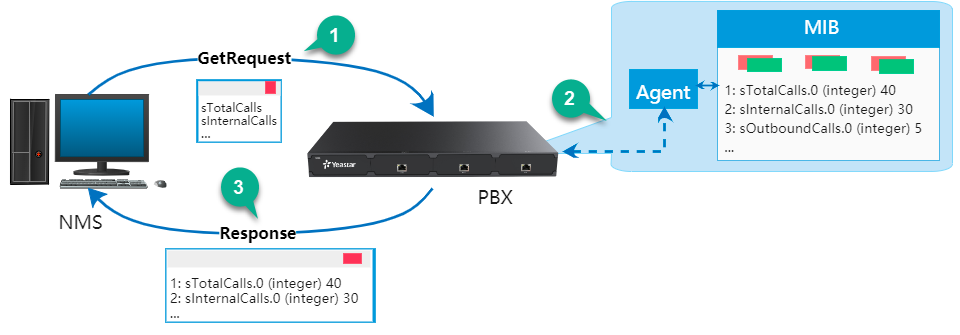SNMP Overview
Yeastar S-Series VoIP PBX support SNMP (Simple Network Management Protocol). The SNMP protocol allows the network administrator to query PBX information anytime, anywhere, and monitor PBX devices in real time.
PBX requirements
- Yeastar S100 VoIP PBX
- Yeastar S300 VoIP PBX
What is SNMP?
SNMP (Simple Network Management Protocol) is a standard network management protocol that is widely used on TCP/IP networks. The administrator can manage various network devices by a central computer, regardless of the differences in device types,vendors, and physical networks. SNMP improves administrators' work efficiency, and reduces management costs.
SNMP components
The SNMP architecture consists of 4 key components:- NMS (Network Management System): The NMS is a manager on a network that uses SNMP to monitor and control network devices.
- Agent: The agent is a process running on a managed device. The agent maintains data on the managed device, responds to request packets from the NMS, and returns management data to the NMS.
- Management object: A management object is an object to be managed on a network device. For example, management objects may include a hardware component (such as an interface board) and parameters configured for the hardware or software (such as a route selection protocol).
- MIB (Management Information Base): MIB defines the attributes of the managed device, including the name, status, access rights, and data type of management objects.

SNMP versions
The following table shows the supported SNMP versions and details:
| Version | Secure | Authenticate | Security | Description |
|---|---|---|---|---|
| SNMPv1 | no | community | no | Applicable to small networks with simple networking and low security requirements or small networks with good security and stability, such as campus networks and small enterprise networks. |
| SNMPv2c | no | community | no |
Applicable to medium and large networks with low security requirements or with good security (for example, VPN) but on which services are so busy that traffic congestion may occur. |
| SNMPv3 | no | user name | no | Applicable to networks of various scales, especially networks that have strict security requirements and can be managed only by authorized network administrators. For example, SNMPv3 can be used if data between the NMS and managed device needs to be transmitted over a public network. |
| Auth | HMAC-MD5 | no | ||
| Auth+Priv | HMAC-MD5 | CBC-DES |
Basic operations of SNMP
- Get: NMS retrieves variables from the managed device.
- Set: NMS sets variables or perform an action on managed device.
- Trap: Managed device notifies the NMS of a fault or event occurring.
How to query PBX information
- The NMS sends a GetRequest packet to the Agent on PBX to query the variables: sTotalCalls, sinternalCalls, etc.
- The Agent queries the variables information (sTotalCalls, sinternalCalls, etc.) from the MIB.
- The Agent sends a Response packet to the NMS.
